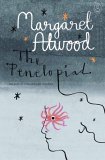
The Myth of Penelope and Odysseus
Homer's Odyssey is not the only version of the story. Mythic material was originally oral, and also local -- a myth would be told one way in one place and quite differently in another. I have drawn on material other than the Odyssey, especially for the details of Penelope's parentage, her early life and marriage, and the scandalous rumors circulating about her. I’ve chosen to give the telling of the story to Penelope and to the twelve hanged maids. The maids form a chanting and singing Chorus, which focuses on two questions that must pose themselves after any close reading of the Odyssey: What led to the hanging of the maids, and what was Penelope really up to? The story as told in the Odyssey doesn't hold water: there are too many inconsistencies. I’ve always been haunted by the hanged maids and, in The Penelopiad, so is Penelope herself." -- from Margaret Atwood's Foreword to The Penelopiad. For more about this series see A Short History of Myth, also in this issue.
"While the story isn't new, Atwood's approach reminds us that there are endlessly original ways to tell it. Grade A." - Entertainment Weekly.
"Despite the jokiness, anachronism and rumbustiousness, Margaret Atwood's Penelope is coherently and persuasively imagined; a heroine transplanted from contemporary Toronto to the Elysian Fields." - London Times.
"Unhurried, unshowy, she gives us the huge pleasures of rhythm and structure and story, and characters too - the rough Odysseus, the perhaps duplicitous wife, Penelope, and her "intolerably beautiful" cousin Helen of Troy." - The Telegraph (UK).
"Much of the story's rich material has been dumped at the back of the book in a single chapter .... This marvelous material seems not to have been metabolized by Atwood's imagination, and the result is merely a riff on a better story that comes dangerously close to being a spoof." - New York Times.
"Like opera lyrics exposed in all their naked banality in translation, myth does not fare well in this colloquial feminist retelling, especially in the choruslike commentary of Penelope's maidservants, who are executed for murky reasons on Odysseus' return, a feminist outrage of particular interest to Atwood. This is an 'Odyssey" that sets sail on a sea of theory. Without language that sings, myth isn't myth at all." - The Boston Globe.
This information about The Penelopiad was first featured
in "The BookBrowse Review" - BookBrowse's membership magazine, and in our weekly "Publishing This Week" newsletter. Publication information is for the USA, and (unless stated otherwise) represents the first print edition. The reviews are necessarily limited to those that were available to us ahead of publication. If you are the publisher or author and feel that they do not properly reflect the range of media opinion now available, send us a message with the mainstream reviews that you would like to see added.
Any "Author Information" displayed below reflects the author's biography at the time this particular book was published.
is the author of more than fifty books of fiction, poetry, and critical essays. She has won the Booker Prize, the Arthur C. Clarke Award for Imagination in Service to Society, the Franz Kafka Prize, the Peace Prize of the German Book Trade, the PEN USA Lifetime Achievement Award, and the Dayton Literary Peace Prize. She lives in Toronto, Canada.




Beware the man of one book
Click Here to find out who said this, as well as discovering other famous literary quotes!
Your guide toexceptional books
BookBrowse seeks out and recommends the best in contemporary fiction and nonfiction—books that not only engage and entertain but also deepen our understanding of ourselves and the world around us.